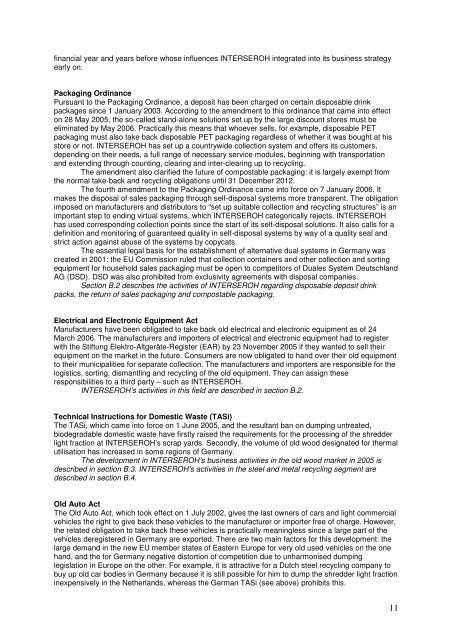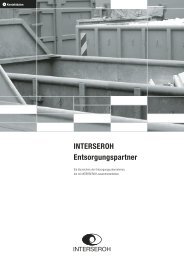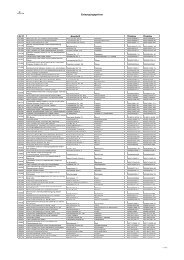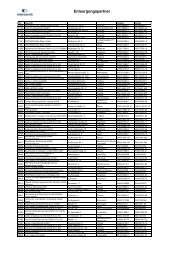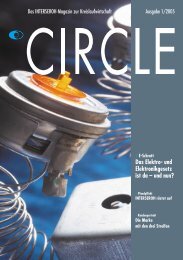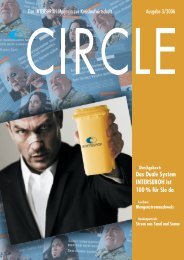Business Report 2005 - Interseroh
Business Report 2005 - Interseroh
Business Report 2005 - Interseroh
You also want an ePaper? Increase the reach of your titles
YUMPU automatically turns print PDFs into web optimized ePapers that Google loves.
financial year and years before whose influences INTERSEROH integrated into its business strategy<br />
early on.<br />
Packaging Ordinance<br />
Pursuant to the Packaging Ordinance, a deposit has been charged on certain disposable drink<br />
packages since 1 January 2003. According to the amendment to this ordinance that came into effect<br />
on 28 May <strong>2005</strong>, the so-called stand-alone solutions set up by the large discount stores must be<br />
eliminated by May 2006. Practically this means that whoever sells, for example, disposable PET<br />
packaging must also take back disposable PET packaging regardless of whether it was bought at his<br />
store or not. INTERSEROH has set up a countrywide collection system and offers its customers,<br />
depending on their needs, a full range of necessary service modules, beginning with transportation<br />
and extending through counting, clearing and inter-clearing up to recycling.<br />
The amendment also clarified the future of compostable packaging: it is largely exempt from<br />
the normal take-back and recycling obligations until 31 December 2012.<br />
The fourth amendment to the Packaging Ordinance came into force on 7 January 2006. It<br />
makes the disposal of sales packaging through self-disposal systems more transparent. The obligation<br />
imposed on manufacturers and distributors to “set up suitable collection and recycling structures” is an<br />
important step to ending virtual systems, which INTERSEROH categorically rejects. INTERSEROH<br />
has used corresponding collection points since the start of its self-disposal solutions. It also calls for a<br />
definition and monitoring of guaranteed quality in self-disposal systems by way of a quality seal and<br />
strict action against abuse of the systems by copycats.<br />
The essential legal basis for the establishment of alternative dual systems in Germany was<br />
created in 2001: the EU Commission ruled that collection containers and other collection and sorting<br />
equipment for household sales packaging must be open to competitors of Duales System Deutschland<br />
AG (DSD). DSD was also prohibited from exclusivity agreements with disposal companies.<br />
Section B.2 describes the activities of INTERSEROH regarding disposable deposit drink<br />
packs, the return of sales packaging and compostable packaging.<br />
Electrical and Electronic Equipment Act<br />
Manufacturers have been obligated to take back old electrical and electronic equipment as of 24<br />
March 2006. The manufacturers and importers of electrical and electronic equipment had to register<br />
with the Stiftung Elektro-Altgeräte-Register (EAR) by 23 November <strong>2005</strong> if they wanted to sell their<br />
equipment on the market in the future. Consumers are now obligated to hand over their old equipment<br />
to their municipalities for separate collection. The manufacturers and importers are responsible for the<br />
logistics, sorting, dismantling and recycling of the old equipment. They can assign these<br />
responsibilities to a third party – such as INTERSEROH.<br />
INTERSEROH’s activities in this field are described in section B.2.<br />
Technical Instructions for Domestic Waste (TASi)<br />
The TASi, which came into force on 1 June <strong>2005</strong>, and the resultant ban on dumping untreated,<br />
biodegradable domestic waste have firstly raised the requirements for the processing of the shredder<br />
light fraction at INTERSEROH’s scrap yards. Secondly, the volume of old wood designated for thermal<br />
utilisation has increased in some regions of Germany.<br />
The development in INTERSEROH’s business activities in the old wood market in <strong>2005</strong> is<br />
described in section B.3. INTERSEROH’s activities in the steel and metal recycling segment are<br />
described in section B.4.<br />
Old Auto Act<br />
The Old Auto Act, which took effect on 1 July 2002, gives the last owners of cars and light commercial<br />
vehicles the right to give back these vehicles to the manufacturer or importer free of charge. However,<br />
the related obligation to take back these vehicles is practically meaningless since a large part of the<br />
vehicles deregistered in Germany are exported. There are two main factors for this development: the<br />
large demand in the new EU member states of Eastern Europe for very old used vehicles on the one<br />
hand, and the for Germany negative distortion of competition due to unharmonised dumping<br />
legislation in Europe on the other. For example, it is attractive for a Dutch steel recycling company to<br />
buy up old car bodies in Germany because it is still possible for him to dump the shredder light fraction<br />
inexpensively in the Netherlands, whereas the German TASi (see above) prohibits this.<br />
11


